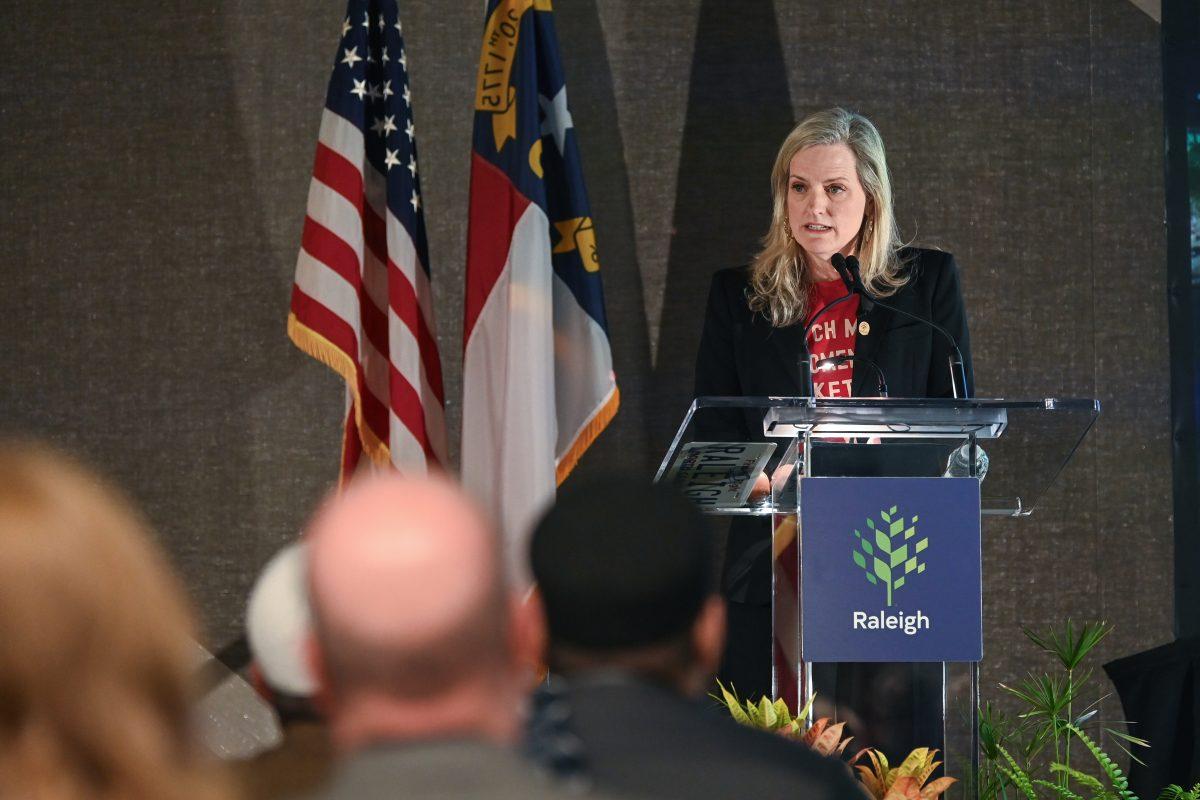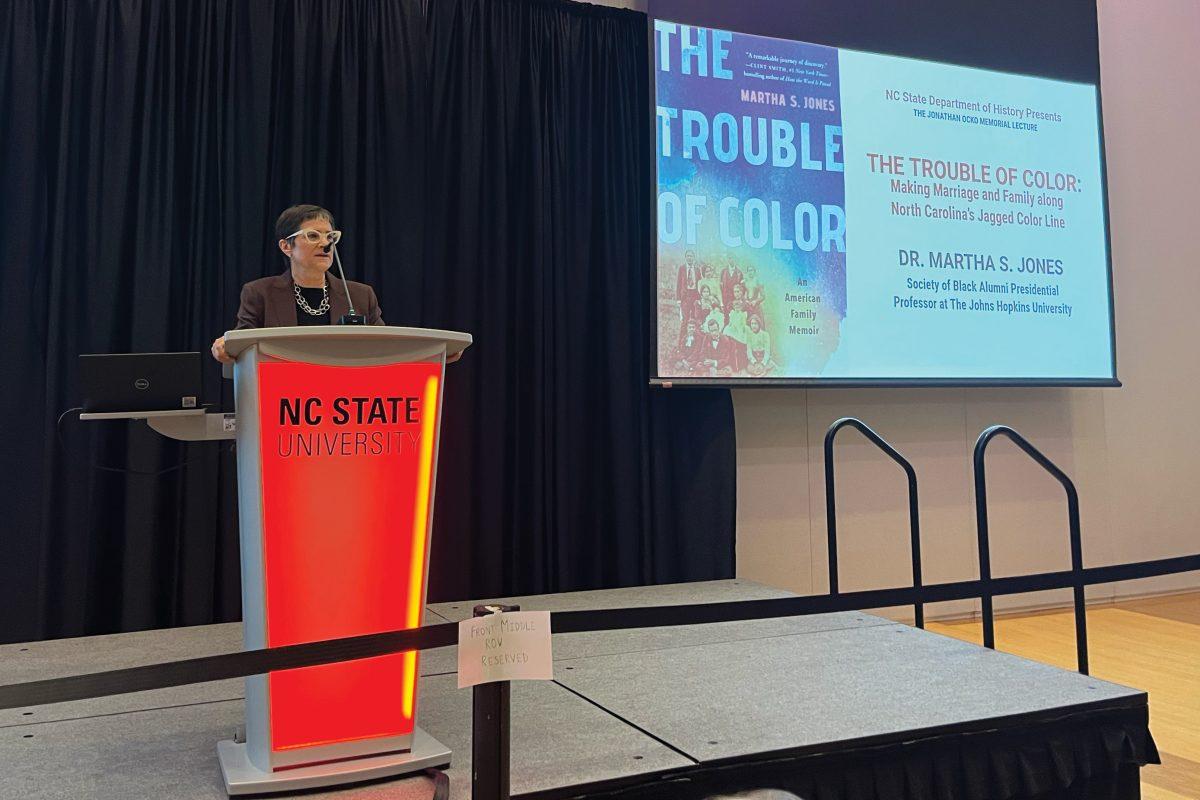Raleigh Mayor Janet Cowell delivered her first “State of the City” address Wednesday evening, focusing on housing affordability, public safety, transportation, quality of life and resilience in the city.
Cowell aimed to highlight the work she and city council have done in the first 100 days of their terms, as well as plans for the next two years. Cowell also mentioned various strategic plans that have been implemented to guide future growth.
Mayor Pro Tempore and council member Stormie Forte, who spoke at the beginning of the meeting, said the city of Raleigh is rapidly growing, with 6% growth since 2020.
“That’s more people looking for housing, driving our roads, using our public safety as well as visiting our parks,” Forte said.
Cowell said the city has a 37,000-unit housing shortage, with the median current cost of housing being $500,000, and the median cost of rent being $1,600. The city currently has approved a potential of 3,060 more units to address the crisis, including five projects that will include affordable housing elements.
Cowell also pointed to potential zoning changes increasing the housing stock over the next two years, but did not mention specific changes.
“We know we need mixed-income, mixed-use housing, integrated with transit,” Cowell said. “So that we can continue to house people in the city.”
The council has also allocated $800,000 to homeless prevention services in the first 100 days and worked with Wake County to open a shelter on January 1st. The council voted in the fall to create the Bring Our Neighbors Home program, housing 66 individuals or 47 families with five additional families now added to the program.
According to Wake County, it’s estimated that roughly 916 people experience literal homelessness — being without an adequate and regular shelter — on any given night in the county.
Cowell said year-over-year violent crime is roughly flat, with a decrease of 18% in property crime. A motor-vehicle theft task force has decreased 7% year-over-year.
“One of the things that surprised me most as mayor is how many cars get stolen,” Cowell said. “This is not unique to Raleigh.”
In the first 100 days, Cowell and the council have hired a new police chief, Rico Boyce, a 25-year veteran of the Raleigh Police Department. Cowell said the police department often has trouble hiring due to low compensation compared to surrounding municipalities, and the city has a smaller force than comparable cities.
“A lot of the public service workers that we train and we hire get hired by other municipalities who pay them a little more,” Cowell said. “So we’re constantly in an arms race.”
Due to a recent graduating class of 40 officers, Cowell said the force is close to zero vacancies. If the current academy class graduates with few officers leaving or dropping out, the department will be at zero vacancies. Compensation has also recently increased for officers.
“There’s also a plan to increase the number of officers so that we can become more like peers and quit putting as much pressure on officers who don’t have enough colleagues, firefighters that don’t have enough colleagues,” Cowell said.
Cowell also mentioned ACORNS, the Addressing Crises through Outreach, Referrals, Networking and Service program, and CARES, the recently-created Crisis Alternative Response for Empathy and Support program, aiming to divert certain cases away from emergency services and toward trained mental health and social work professionals.
ACORNS is embedded with the police force, while CARES is independent of the force. The council also plans to continue working on violence prevention programs, increasing compensation and the Cop on the Block program, aiming to involve officers more directly with citizens and communities.
Cowell said the council is currently reworking its bid for the New Bern Bus Rapid Transit Corridor, which will have frequent service, dedicated lanes and station platforms to increase the quality of service.
Within the first 100 days, the council has funded the first $20 million for the additional Southern and Western BRT routes, the latter of which will travel down Western Boulevard and past NC State’s campus to Downtown Cary.
The council is also aiming to increase funding for the E-Bike Rebate Program, focusing on lower-income residents to provide funding for electric bikes and expand sustainable transportation in the city. Over the next two years, Cowell and the council aim to secure current federal funding for projects such as the BRT amidst uncertainty.
“I am working with the mayors of Wake County to write letters to the whole delegation,” Cowell said, “In fact, the mayor of Holly Springs is up in D.C. right now, delivering those letters.”
Cowell said within the first 100 days, the council has approved the master plan for the future 14-acre Smokey Hollow Park in Downtown Raleigh, as well as Walnut Creek Trail improvements. The council also funded the Durant Creek Master Plan and Pigeon House Branch Watershed study to improve water quality, reduce flooding impacts and repair infrastructure and streambanks.
The council has also approved relocating Red Hat Amphitheater and closing a block of South Street between McDowell and Dawson Streets to facilitate the change and make room for the expansion of the Raleigh Convention Center. A new city hall aiming to centralize and modernize services is coming soon, Cowell said, but no specific dates have been provided.
Cowell thanked city staff, the council and the city manager.
“Cities matter more than ever,” Cowell said. “They’re where we interface with the world. It’s where our basic needs get met. It’s the clean water, it’s the transportation, it’s the housing. And in uncertain times it’s also where we find community, a sense of meaning and safety.”
The full address can be found here.












